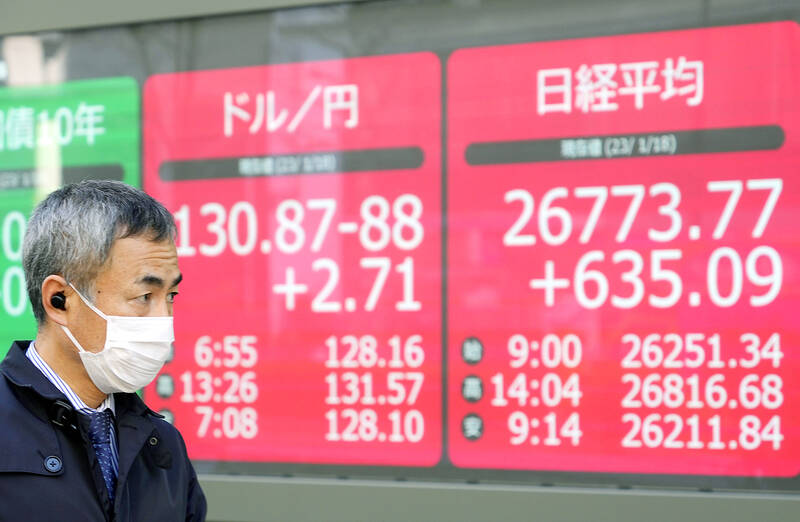Stocks rose globally yesterday while the yen tumbled, after the Bank of Japan (BOJ) poured cold water on monetary tightening expectations, and economic and earnings data proved cheery for European markets.
In addition, data showed that inflation in the UK dropped to a three-month low of 10.5 percent last month, the latest sign that global inflationary pressures are abating.
Europe’s STOXX 600 index rose to its highest level since April last year, and London’s FTSE 100 scaled a fresh four-and-a-half-year high after the latest British inflation numbers, while US stock futures were mixed.

Photo: EPA-EFE
MSCI’s broadest index of shares in the Asia-Pacific region outside of Japan rose 0.4 percent.
The market spotlight was also on Japan, where the yen slid and government bond yields fell the most in two decades at one point, retreating sharply from the BOJ’s 0.5 percent ceiling after policymakers decided to keep yield curve controls in place.
The central bank last month stunned the market by raising its cap on the 10-year yield to 0.5 percent from 0.25 percent, doubling the band it would permit above or below its target of zero percent. Since then, speculation had swirled that the central bank could tweak its yield curve control policy further or even scrap it.
However, instead of changing its stimulus program, the BOJ crafted a new weapon to prevent long-term rates from rising too much — a move some analysts took as a sign BOJ Governor Haruhiko Kuroda would hold off making big policy shifts during the remaining months of his term, which ends in April.
“This step will allow us to push down longer-term interest rates, without directly affecting supply and demand of the cash Japanese government bond market,” Kuroda told a news conference. “We’d like to use this tool for various maturities, and in various ways.”
The 10-year yield plunged as much as 14 basis points to 0.36 percent at its lowest point, which would have been the biggest one-day decline since September 2003, before edging back up to 0.43 percent as of 6:24pm. The Nikkei 225 index jumped 2.5 percent to 26,791.12, its highest close since Dec. 19 last year.
“It was a tough day for the bond vigilantes who were positioned to bully the BOJ into a policy change not justified by their economic forecasts,” Westpac Banking Corp senior currency strategist Sean Callow said.
US DOLLAR RISES
The US dollar was up 1 percent at ¥129.53, but well off session highs.
The dollar index, which measures the safe-haven US dollar against six peers, rose 0.4 percent. The pound rose more than 0.4 percent, and the euro gained 0.6 percent.
Meanwhile, oil prices rose yesterday, extending the previous session’s gains, driven by optimism that China lifting its strict COVID-19 curbs would lead to a recovery in fuel demand in the world’s top oil importer.

Taiwan Transport and Storage Corp (TTS, 台灣通運倉儲) yesterday unveiled its first electric tractor unit — manufactured by Volvo Trucks — in a ceremony in Taipei, and said the unit would soon be used to transport cement produced by Taiwan Cement Corp (TCC, 台灣水泥). Both TTS and TCC belong to TCC International Holdings Ltd (台泥國際集團). With the electric tractor unit, the Taipei-based cement firm would become the first in Taiwan to use electric vehicles to transport construction materials. TTS chairman Koo Kung-yi (辜公怡), Volvo Trucks vice president of sales and marketing Johan Selven, TCC president Roman Cheng (程耀輝) and Taikoo Motors Group

Among the rows of vibrators, rubber torsos and leather harnesses at a Chinese sex toys exhibition in Shanghai this weekend, the beginnings of an artificial intelligence (AI)-driven shift in the industry quietly pulsed. China manufactures about 70 percent of the world’s sex toys, most of it the “hardware” on display at the fair — whether that be technicolor tentacled dildos or hyper-realistic personalized silicone dolls. Yet smart toys have been rising in popularity for some time. Many major European and US brands already offer tech-enhanced products that can enable long-distance love, monitor well-being and even bring people one step closer to

RECORD-BREAKING: TSMC’s net profit last quarter beat market expectations by expanding 8.9% and it was the best first-quarter profit in the chipmaker’s history Taiwan Semiconductor Manufacturing Co (TSMC, 台積電), which counts Nvidia Corp as a key customer, yesterday said that artificial intelligence (AI) server chip revenue is set to more than double this year from last year amid rising demand. The chipmaker expects the growth momentum to continue in the next five years with an annual compound growth rate of 50 percent, TSMC chief executive officer C.C. Wei (魏哲家) told investors yesterday. By 2028, AI chips’ contribution to revenue would climb to about 20 percent from a percentage in the low teens, Wei said. “Almost all the AI innovators are working with TSMC to address the

Malaysia’s leader yesterday announced plans to build a massive semiconductor design park, aiming to boost the Southeast Asian nation’s role in the global chip industry. A prominent player in the semiconductor industry for decades, Malaysia accounts for an estimated 13 percent of global back-end manufacturing, according to German tech giant Bosch. Now it wants to go beyond production and emerge as a chip design powerhouse too, Malaysian Prime Minister Anwar Ibrahim said. “I am pleased to announce the largest IC (integrated circuit) Design Park in Southeast Asia, that will house world-class anchor tenants and collaborate with global companies such as Arm [Holdings PLC],”